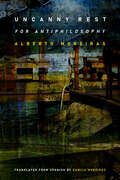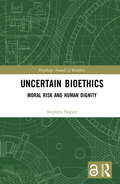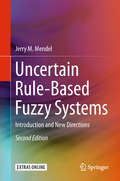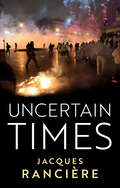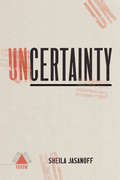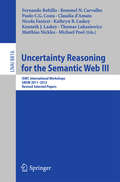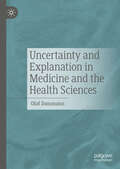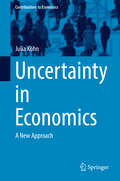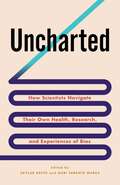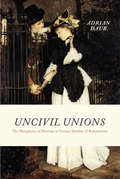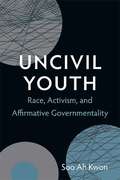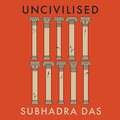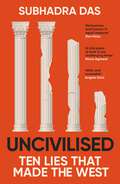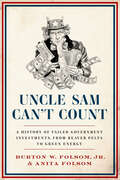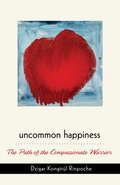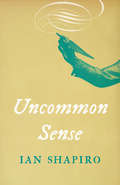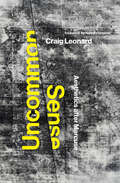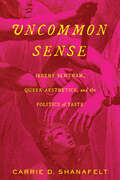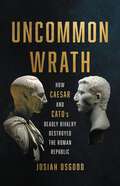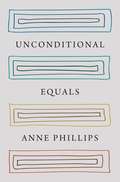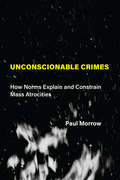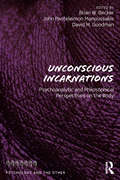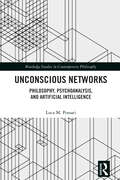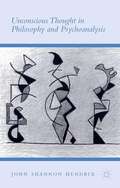- Table View
- List View
Uncanny Rest: For Antiphilosophy
by Alberto MoreirasIn Uncanny Rest Alberto Moreiras offers a meditation on intellectual life under the suspension of time and conditions of isolation. Focusing on his personal day-to-day experiences of the “shelter-in-place” period during the first months of the coronavirus pandemic, Moreiras engages with the limits and possibilities of critical thought in the realm of the infrapolitical—the conditions of existence that exceed average understandings of politics and philosophy. In each dated entry he works through the process of formulating a life’s worth of thought and writing while attempting to locate the nature of thought once the coordinates of everyday life have changed. Offering nothing less than a phenomenology of thinking, Moreiras shows how thought happens in and out of a life, at a certain crossroads where memories collide, where conversations with interlocutors both living and dead evolve and thinking during a suspended state becomes provisional and uncertain.
Uncertain Bioethics: Moral Risk and Human Dignity (Routledge Annals of Bioethics)
by Stephen NapierBioethics is a field of inquiry and as such is fundamentally an epistemic discipline. Knowing how we make moral judgments can bring into relief why certain arguments on various bioethical issues appear plausible to one side and obviously false to the other. Uncertain Bioethics makes a significant and distinctive contribution to the bioethics literature by culling the insights from contemporary moral psychology to highlight the epistemic pitfalls and distorting influences on our apprehension of value. Stephen Napier also incorporates research from epistemology addressing pragmatic encroachment and the significance of peer disagreement to justify what he refers to as epistemic diffidence when one is considering harming or killing human beings. Napier extends these developments to the traditional bioethical notion of dignity and argues that beliefs subject to epistemic diffidence should not be acted upon. He proceeds to apply this framework to traditional and developing issues in bioethics including abortion, stem cell research, euthanasia, decision-making for patients in a minimally conscious state, and risky research on competent human subjects.
Uncertain Causation in Tort Law
by Diego M. Papayannis Martín-Casals, Miquel and Papayannis, Diego M. Miquel Martín-CasalsThis discussion of causal uncertainty in tort liability adopts a comparative approach in order to highlight the important normative, epistemological and procedural implications of the various proposed solutions. Occupying a middle ground between the legal perspective and the philosophical views that are at stake when it comes to the resolution of tort law cases in a context of causal uncertainty, the arguments will be of great interest to legal scholars, legal philosophers and advanced tort law students.
Uncertain Rule-Based Fuzzy Systems: Introduction And New Directions
by Jerry M. Mendel*Type-2 fuzzy logic: Breakthrough techniques for modeling uncertainty *Key applications: digital mobile communications, computer networking, and video traffic classification *Detailed case studies: Forecasting time series and knowledge mining *Contains 90+ worked examples, 110+ figures, and brief introductory primers on fuzzy logic and fuzzy sets Breakthrough fuzzy logic techniques for handling real-world uncertainty. The world is full of uncertainty that classical fuzzy logic cant model. Now, however, theres an approach to fuzzy logic that can model uncertainty: type-2 fuzzy logic. In this book, the developer of type-2 fuzzy logic demonstrates how it overcomes the limitations of classical fuzzy logic, enabling a wide range of applications from digital mobile communications to knowledge mining. Dr. Jerry Mendel presents a bottom-up approach that begins by introducing traditional type-1 fuzzy logic, explains how it can be modified to handle uncertainty, and, finally, adds layers of complexity to handle increasingly sophisticated applications. Coverage includes: *The sources of uncertainty and the role of membership functions *Type-2 fuzzy sets: operations, properties, and centro
Uncertain Times
by Jacques RanciereThe global triumph of democracy was announced thirty years ago, promising an age of consensus in which the dispassionate consideration of objective problems would give birth to a world at peace. Today, these grand hopes lie in ruins, and the era touted as new has turned out to be remarkably similar to the old order. To understand why this might be so, we need to examine the nature of the consensus itself, which is not the peace that it promised but rather the map of a territory on which new forms of warfare are being waged. The objective reality that imposed itself at the end of the 1990s was an absolutized and globalized capitalism which has produced ever more inequality, exclusion and hate. In this book Jacques Rancière delivers a frank and piercing critique of the globalized capitalist consensus. The invasion of Iraq, the riots on Capitol Hill and the rise of the European far right all attest to the true nature of this consensus, as does the current state-sanctioned racism which exploits the disenchanted progressive tradition and is led by an intelligentsia that claims to be left-wing. At the same time, Rancière praises the dynamism of social movements which affirm the power of the assembly of equals and its capacity for worldmaking: autonomous protest collectives have proven themselves capable of opening breaches in the consensual order and challenging the post-1989 system of domination.
Uncertainty (Boston Review / Forum)
by Sheila JasanoffA wide-raging exploration of the place of uncertainty in our emotional and political lives.From climate change to the pandemic, uncertainty looms large over our public and personal lives. It is also the core feature of democratic life: while democratic governance seemingly heightens individual power, it exposes our life chances to the uncertain activity of others. We do not exercise control over those to whom we appeal, and yet we are constantly dependent on their actions for the goods in life we seek. Sheila Jasanoff opens a forum on uncertainty and democracy in this volume, arguing that ideas around our autonomy, our freedom, and our individual agency, particularly in the US, obscure our dependence on others in so many ways. To recognize this political emotion is to start to see the transformative potential in uncertainty. The debate that follows explores the ideas about uncertainty and experts in a democracy, as well its scientific, philosophic, and emotional aspects.
Uncertainty Reasoning for the Semantic Web III
by Fernando Bobillo Rommel N. Carvalho Paulo C. G. Costa Claudia D'Amato Nicola Fanizzi Kathryn B. Laskey Kenneth J. Laskey Thomas Lukasiewicz Matthias Nickles Michael PoolThis book contains revised and significantly extended versions of selected papers from three workshops on Uncertainty Reasoning for the Semantic Web (URSW), held at the International Semantic Web Conferences (ISWC) in 2011, 2012, and 2013. The 16 papers presented were carefully reviewed and selected from numerous submissions. The papers included in this volume are organized in topical sections on probabilistic and Dempster-Shafer models, fuzzy and possibilistic models, inductive reasoning and machine learning, and hybrid approaches.
Uncertainty and Explanation in Medicine and the Health Sciences
by Olaf DammannThis book offers a comprehensive account of how uncertainty is tackled in medicine and the health sciences. Olaf Dammann explores recent accounts of medicine as ineffective and suggests that the impression that medicine does not achieve its goal is, at least in part, due to the aleatoric (natural) uncertainty of biomedical processes and the subsequent epistemic (cognitive) uncertainty of those who desire solid information about such processes. Dammann shows how concepts like inference, explanation, and causometry help mitigate this disconnect. He points toward the possibility that some of the statistically rigid and formalized approaches (such as the randomized controlled trial as the gold standard for the justification of medical interventions) might better be replaced by approaches that emphasize the coherence of evidence and the people’s needs for helpful health interventions (auxiliarianism).
Uncertainty in Economics
by Julia KöhnIn this book the author develops a new approach to uncertainty in economics, which calls for a fundamental change in the methodology of economics. It provides a comprehensive overview and critical appraisal of the economic theory of uncertainty and shows that uncertainty was originally conceptualized both as an epistemic and an ontological problem. As a result of the economic professions’ attempt to become acknowledged as a science, the more problematic aspect of ontological uncertainty has been neglected and the subjective probability approach to uncertainty became dominant in economic theory. A careful analysis of ontological theories of uncertainty explains the blindness of modern economics to economic phenomena such as instability, slumps or excessive booms. Based on these findings the author develops a new approach that legitimizes a New Uncertainty Paradigm in economics.
Uncharted: How Scientists Navigate Their Own Health, Research, and Experiences of Bias
by Skylar Bayer Gabriela Serrato MarksPeople with disabilities are underrepresented in STEM fields, and all too often, they face isolation and ableism in academia. Uncharted is a collection of powerful first-person stories by current and former scientists with disabilities or chronic conditions who have faced changes in their careers, including both successes and challenges, because of their health. It gives voice to common experiences that are frequently overlooked or left unspoken. These deeply personal accounts describe not only health challenges but also the joys, sorrows, humor, and wonder of science and scientists.With a breadth of perspectives on being disabled or chronically ill, these stories highlight the intersectionality of minoritized identities with the disability community. Uncharted features essays by contributors who are d/Deaf, blind, neurodivergent, wheelchair users, have experienced traumatic brain injuries, have blood sugar disorders, have rare medical diagnoses, or have received psychiatric diagnoses, among many others. In many cases, the scientific field is not fully accessible to them, and they frankly describe struggling as well as thriving alongside their conditions.This book serves as representation for scientists who have never felt comfortable disclosing their disability or who have never felt fully understood. The stories shared in this book seek to normalize medical conditions and disabilities in scientific culture, offering recommendations for how and why to improve access. Uncharted is vital and compelling reading for current and aspiring scientists who want to make their fields more inclusive and supportive for everyone.
Uncivil Unions: The Metaphysics of Marriage in German Idealism and Romanticism
by Adrian Daub“What a strange invention marriage is!” wrote Kierkegaard. “Is it the expression of that inexplicable erotic sentiment, that concordant elective affinity of souls, or is it a duty or a partnership . . . or is it a little of all that?” Like Kierkegaard a few decades later, many of Germany’s most influential thinkers at the turn of the eighteenth century wondered about the nature of marriage but rejected the easy answers provided by biology and theology. In Uncivil Unions, Adrian Daub presents a truly interdisciplinary look at the story of a generation of philosophers, poets, and intellectuals who turned away from theology, reason, common sense, and empirical observation to provide a purely metaphysical justification of marriage. Through close readings of philosophers like Fichte and Schlegel, and novelists like Sophie Mereau and Jean Paul, Daub charts the development of this new concept of marriage with an insightful blend of philosophy, cultural studies, and theory. The author delves deeply into the lives and work of the romantic and idealist poets and thinkers whose beliefs about marriage continue to shape ideas about gender, marriage, and sex to the present day.
Uncivil Youth: Race, Activism, and Affirmative Governmentality
by Kwon Soo AhIn Uncivil Youth, Soo Ah Kwon explores youth of color activism as linked to the making of democratic citizen-subjects. Focusing attention on the relations of power that inform the social and political practices of youth of color, Kwon examines how after-school and community-based programs are often mobilized to prevent potentially "at-risk" youth from turning to "juvenile delinquency" and crime. These sorts of strategic interventions seek to mold young people to become self-empowered and responsible citizens. Theorizing this mode of youth governance as "affirmative governmentality," Kwon investigates the political conditions that both enable youth of color to achieve meaningful change and limit their ability to do so given the entrenchment of nonprofits in the logic of a neoliberal state. She draws on several years of ethnographic research with an Oakland-based, panethnic youth organization that promotes grassroots activism among its second-generation Asian and Pacific Islander members (ages fourteen to eighteen). While analyzing the contradictions of the youth organizing movement, Kwon documents the genuine contributions to social change made by the young people with whom she worked in an era of increased youth criminalization and anti-immigrant legislation.
Uncivilised: Ten Lies that Made the West
by Subhadra DasSome things are a given. The value of a good education. Time's progress. Death.Except most of the ideas that form Western Civilisation are just that - ideas. Taking cues from Greek philosophy and honed in the Enlightenment, certain notions about humanity and human society grew into the tenets we live by, and we haven't questioned them a great deal since. But isn't it time we asked who really benefits from the values at the core of our society? How much truth lies in a science that conjured up 'race'? Who do laws and nations really protect? Why does it feel like time is money? What even is 'art'?And the real question - is the West really as 'civilised' as it thinks it is?This audiobook will put everything back on the table and ask listeners to reconsider what they thought they knew about civilisation. Taking 10 core values of Western Civilisation in turn, it will examine the root of the idea, how it developed, and how it's impacted the way we live. Most importantly it will reveal how each of these ideas was either created in opposition to another group of people, or based on ideas they had first (and better). (Un)civilised will ask listeners to open their eyes to the why behind how they think the world works.(P) 2024 Hodder & Stoughton Limited
Uncivilised: Ten Lies that Made the West
by Subhadra DasPre-order the enthralling and radical book that overturns our assumptions about civilisation and society'A witty and accessible survey of the shortcomings of western civilisation as many people imagine it' ANGELA SAINI, author of Superior'A vital piece of work in our challenging times that reminds us of the rich history and influences outside the West. Das writes with passion and humour to open our eyes to the history that has shaped our world' ROMA AGRAWAL, author of Built and Nuts and Bolts___________Some things are a given: knowledge is power, time is money, justice is blind. But many of the big ideas that underpin Western civilisation are just that - ideas. Taking cues from Greek philosophy and honed in the Enlightenment, certain notions about humanity and society grew into the tenets we still live by today, and we haven't questioned them a great deal since.But what if they're not just ideas? What if they're outright lies? Isn't it time we asked who really benefits from the values at the core of our society? What is unbiased about a science that conjured up 'race'? Who do laws and nations actually protect? What even is 'art'? And the real question: is the West really as 'civilised' as it thinks it is?Uncivilised puts everything back on the table and asks readers to reconsider what they thought they knew about civilisation, starting with the ten lies that have shaped their lives.
Uncle Sam Can't Count: A History of Failed Government Investments, from Beaver Pelts to Green Energy
by Burton W. Folsom Jr. Anita FolsomAn enlightening overview of America’s misadventures in economic investment from the Revolutionary era to the Obama administration.From the days of George Washington through World War II to today, government subsidies have failed the American people time and again. Draining the Treasury of cash, this doomed attempt to “pick winners” only serves to impede economic growth—and hurt the very companies receiving aid. But why does federal aid seem to have a reverse Midas touch? In Uncle Sam Can’t Count, Burt and Anita Folsom argue that federal officials don’t have the same abilities or incentives as entrepreneurs. In addition, federal control always leads to politicization. And what works for politicians often doesn’t work in the marketplace. Filled with examples of government failures and free market triumphs, from John Jacob Astor to the Wright Brothers, World War II amphibious landing craft to Detroit, Uncle Sam Can’t Count is a hard-hitting critique of government investment that demonstrates why business should be left exclusively to private entrepreneurs.
Uncommon Happiness
by Marcia Binder Schmidt Dzigar KongtrulFrom 2005 to 2007, teacher Dzigar Kongtrül Rinpoche gave classes on Buddhist scholar Shantideva’s The Way of the Boddhisattva at a noted retreat center in Northern California. His commentaries revealed such a deep understanding that practitioner Marcia Binder Schmidt decided to collect them for other students of Buddhism as an independent work. This book is the result. Beginning with an overview of the entire path of Buddhism, Kongtrül Rinpoche goes on to examine different aspects of Shantideva’s text, always relating the teachings to individual experience. He explores in depth the training of the four immeasurables—equanimity, loving kindness, compassion, and sympathetic joy—and discusses the importance of wholehearted engagement in the process. His advice for setting up and maintaining a spiritual practice is both practical and inspiring. Although the book contains three years of teachings, it remains remarkably compact, reflecting Kongtrül Rinpoche’s characteristic directness and emphasis on implementation. In the words of the editor, “Dharma practice needs to be more than mere theory. Dharma needs to be trained in, integrated into our lives, and embraced by wisdom.” Uncommon Happiness contains the guidance to undergo that training with the right attitude of clarity and commitment.
Uncommon Sense
by Ian ShapiroA spirited defense of the Enlightenment against assaults from both the left and the right that explains its urgent implications for our contemporary politics Ours is an age when optimism about politics is hard to come by. Ian Shapiro explains why this is so and, without minimizing the daunting challenges, spells out an appropriate response. Written in the indomitable spirit exemplified by Tom Paine, Uncommon Sense is a rich source of insight and inspiration in dark political times. The Enlightenment commitments to reason and science are under assault from the Postmodern Left and the Authoritarian Right. Shapiro explains why the attacks are misguided and politically destructive. He agrees with the critics that there are no universal principles of justice that transcend political battles and no fair, impartial rules to govern the distribution of income, wealth, rights, or opportunities. But abandoning the search for them as futile does not mean junking the Enlightenment&’s core political goal: to deploy the tools of reason and science to fight domination. Democracy is essential to vindicating that goal, yet citizens in many democracies are profoundly alienated and many democracies are in danger of failing. Shapiro explains what has gone wrong, debunks ill-considered remedies, and spells out better ones—deepening and extending his previous writing on political theory and democratic politics.
Uncommon Sense: Aesthetics after Marcuse
by Craig LeonardAn examination of Herbert Marcuse&’s political claim for the aesthetic dimension, focusing on defamiliarization as a means of developing radical sensibility.In Uncommon Sense, Craig Leonard argues for the contemporary relevance of the aesthetic theory of Herbert Marcuse—an original member of the Frankfurt School and icon of the New Left—while also acknowledging his philosophical limits. His account reinvigorates Marcuse for contemporary readers, putting his aesthetic theory into dialogue with antiracist and anti-capitalist activism. Leonard emphasizes several key terms not previously analyzed within Marcuse&’s aesthetics, including defamiliarization, anti-art, and habit. In particular, he focuses on the centrality of defamiliarization—a subversion of common sense that can be a means to the development of what Marcuse refers to as &“radical sensibility.&” Leonard brings forward Marcuse&’s claim that the aesthetic dimension is political because of its refusal to operate according to the repressive common sense that establishes and maintains relationships dictated by advanced capitalism. For Marcuse, defamiliarization is at the center of the aesthetic dimension, offering the direct means of stimulating its political potential. Leonard expands upon Marcuse&’s aesthetics by drawing on the work of Sylvia Wynter, going beyond Marcuse&’s predominantly European and patrilineal intellectual framework—while still retaining his aesthetic theory&’s fundamental characteristics—toward a human dimension requiring decolonial, feminist, antiracist, and counterpoetic perspectives.
Uncommon Sense: Jeremy Bentham, Queer Aesthetics, and the Politics of Taste
by Carrie D. ShanafeltInfamous for authoring two concepts since favored by government powers seeking license for ruthlessness—the utilitarian notion of privileging the greatest happiness for the most people and the panopticon—Jeremy Bentham is not commonly associated with political emancipation. But perhaps he should be. In his private manuscripts, Bentham agonized over the injustice of laws prohibiting sexual nonconformity, questioning state policy that would put someone to death merely for enjoying an uncommon pleasure. He identified sources of hatred for sexual nonconformists in philosophy, law, religion, and literature, arguing that his goal of "the greatest happiness" would be impossible as long as authorities dictate whose pleasures can be tolerated and whose must be forbidden. Ultimately, Bentham came to believe that authorities worked to maximize the suffering of women, colonized and enslaved persons, and sexual nonconformists in order to demoralize disenfranchised people and prevent any challenge to power.In Uncommon Sense, Carrie Shanafelt reads Bentham’s sexual nonconformity papers as an argument for the toleration of aesthetic difference as the foundation for egalitarian liberty, shedding new light on eighteenth-century aesthetics and politics. At odds with the common image of Bentham as a dehumanizing calculator or an eccentric projector, this innovative study shows Bentham at his most intimate, outraged by injustice and desperate for the end of sanctioned, discriminatory violence.
Uncommon Wrath: How Caesar and Cato's Deadly Rivalry Destroyed the Roman Republic
by Josiah OsgoodA dual biography of Julius Caesar and Cato the Younger that offers a dire warning: republics collapse when partisanship overrides the common good. In Uncommon Wrath, historian Josiah Osgood tells the story of how the political rivalry between Julius Caesar and Marcus Cato precipitated the end of the Roman Republic. As the champions of two dominant but distinct visions for Rome, Caesar and Cato each represented qualities that had made the Republic strong, but their ideological differences entrenched into enmity and mutual fear. The intensity of their collective factions became a tribal divide, hampering their ability to make good decisions and undermining democratic government. The men&’s toxic polarity meant that despite their shared devotion to the Republic, they pushed it into civil war. Deeply researched and compellingly told, Uncommon Wrath is a groundbreaking biography of two men whose hatred for each other destroyed the world they loved.
Unconditional Equals
by Anne PhillipsWhy equality cannot be conditional on a shared human “nature” but has to be for allFor centuries, ringing declarations about all men being created equal appealed to a shared human nature as the reason to consider ourselves equals. But appeals to natural equality invited gradations of natural difference, and the ambiguity at the heart of “nature” enabled generations to write of people as equal by nature while barely noticing the exclusion of those marked as inferior by their gender, race, or class. Despite what we commonly tell ourselves, these exclusions and gradations continue today. In Unconditional Equals, political philosopher Anne Phillips challenges attempts to justify equality by reference to a shared human nature, arguing that justification turns into conditions and ends up as exclusion. Rejecting the logic of justification, she calls instead for a genuinely unconditional equality.Drawing on political, feminist, and postcolonial theory, Unconditional Equals argues that we should understand equality not as something grounded in shared characteristics but as something people enact when they refuse to be considered inferiors. At a time when the supposedly shared belief in human equality is so patently not shared, the book makes a powerful case for seeing equality as a commitment we make to ourselves and others, and a claim we make on others when they deny us our status as equals.
Unconscionable Crimes: How Norms Explain and Constrain Mass Atrocities
by Paul C. MorrowThe first general theory of the influence of norms--moral, legal and social--on genocide and mass atrocity.How can we explain--and prevent--such large-scale atrocities as the Holocaust? In Unconscionable Crimes, Paul Morrow presents the first general theory of the influence of norms--moral, legal and social--on genocide and mass atrocity. After offering a clear overview of norms and norm transformation, rooted in recent work in moral and political philosophy, Morrow examines numerous twentieth-century cases of mass atrocity, drawing on documentary and testimonial sources to illustrate the influence of norms before, during, and after such crimes.
Unconscious Incarnations: Psychoanalytic and Philosophical Perspectives on the Body (Psychology and the Other)
by John Panteleimon Manoussakis Brian W. Becker David M. GoodmanUnconscious Incarnations considers the status of the body in psychoanalytic theory and practice, bringing Freud and Lacan into conversation with continental philosophy to explore the heterogeneity of embodied life. By doing so, the body is no longer merely an object of scientific inquiry but also a lived body, a source of excessive intuition and affectivity, and a raw animality distinct from mere materiality. The contributors to this volume consist of philosophers, psychoanalytic scholars, and practitioners whose interdisciplinary explorations reformulate traditional psychoanalytic concepts such as trauma, healing, desire, subjectivity, and the unconscious. Collectively, they build toward the conclusion that phenomenologies of embodiment move psychoanalytic theory and practice away from representationalist models and toward an incarnational approach to psychic life. Under such a carnal horizon, trauma manifests as wounds and scars, therapy as touch, subjectivity as bodily boundedness, and the unconscious ‘real’ as an excessive remainder of flesh. Unconscious incarnations signal events where the unsignifiable appears among signifiers, the invisible within the visible, and absence within presence. In sum: where the flesh becomes word and the word retains its flesh. Unconscious Incarnations seeks to evoke this incarnational approach in order to break through tacit taboos toward the body in psychology and psychoanalysis. This interdisciplinary work will appeal greatly to psychoanalysts and psychoanalytic psychotherapists as well as philosophy scholars and clinical psychologists.
Unconscious Networks: Philosophy, Psychoanalysis, and Artificial Intelligence (Routledge Studies in Contemporary Philosophy)
by Luca M. PossatiThis book develops an original theoretical framework for understanding human-technology relations. The author’s approach, which he calls technoanalysis, analyzes artificial intelligence based on Freudian psychoanalysis, biosemiotics, and Latour’s actor-network theory. How can we communicate with AI to determine shared values and objectives? And what, ultimately, do we want from machines? These are crucial questions in our world, where the influence of AI-based technologies is rapidly growing. Unconscious dynamics influence AI and digital technology and understanding them is essential to better controlling AI systems. This book’s unique methodology— which combines psychoanalysis, biosemiotics, and actor-network theory—reveals a radical reformulation of the problem of the human mind. Technoanalysis views the mind as a hybrid network of humans and nonhuman actants in constant interaction with one another. The author argues that human unconscious dynamics influence and shape technology, just as technology influences and shapes human unconscious dynamics. He proceeds to show how this conception of the relationship between the unconscious and technology can be applied to social robotics and AI. Unconscious Networks will appeal to scholars and advanced students interested in philosophy of technology, philosophy of artificial intelligence, psychoanalysis, and science and technology studies.
Unconscious Thought in Philosophy and Psychoanalysis
by John Shannon HendrixUnconscious Thought in Philosophy and Psychoanalysisexplores concepts throughout the history of philosophy that suggest the possibility of unconscious thought and lay the foundation for ideas of unconscious thought in modern philosophy and psychoanalysis. Hendrix considers the workings of unconscious thought, and the role that unconscious thought plays in thinking, language, perception, and human identity. The focus is on the metaphysical and philosophical concepts of unconscious thought, as opposed to the empirical or scientific phenomenon of 'the unconscious', and it is argued that these metaphysical concepts still played an important role in the psychoanalysis of Sigmund Freud and Jacques Lacan. With chapters drawing on a wide range of philosophers from Plotinus to Freud and Lacan,Unconscious Thought in Philosophy and Psychoanalysis casts an original and thought-provoking perspective on the relation between unconscious thought and conscious thought, different kinds of thinking, and the relation between thinking and perceiving.
